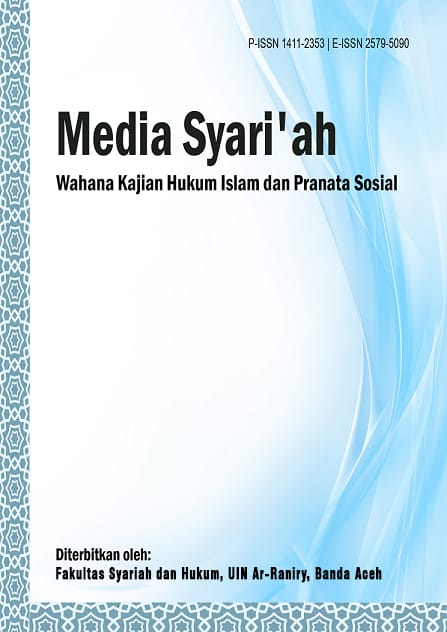Penutup Aurat bagi Perempuan Transgender dalam Hukum Islam
DOI:
https://doi.org/10.22373/jms.v22i2.8413Keywords:
hiwalah, jual beli hari kerja, anjak piutang SyariahAbstract
Abstract
This study describes the review of Islamic law related to the sale and purchase of workdays conducted by factory workers Oil palm Fabrique in Simpang Nibung Rawas Village, South Sumatra Province. This paper is field research by interviewing 13 factory workers to get an overview of buying and selling working days. This study also uses a literature review from Islamic legal sources and MUI fatwas to explain the appropriateness of buying and selling working days with Islamic legal principles. In practice, buying and selling working days is not following the provisions of the MUI DSN Fatwa because the ujrah imposed on the seller is determined by one party, the buyer, and the amount of the ujrah is expressed in terms of percentage rather than in nominal form. Besides, there is a mechanism that causes the transaction to contain gharar elements such as the sale of working days that are not yet owned, and the presence of gharar elements creates a new element, namely usury. Sales of working days that are not yet owned by workers cause at the end of the agreement the seller is required to pay the principal receivables accompanied by profits determined by the buyer that can be equated with borrowing money with interest. This research suggests that factory workers borrow funds from Islamic financial institutions that are more in line with Islamic legal guidance This research suggests factory workers not to continue the practice of buying and selling weekdays because there are elements of gharar and usury in it and to consider Islamic financial institutions and zakat institutions as a solution for lending funds.
Abstrak
Penelitian ini menjelaskan mengenai kajian Hukum Islam terkait jual beli hari kerja yang dilakukan oleh buruh pabrik CV. Sawit yang ada di DesaSimpang Nibung Rawas, Provinsi Sumatera Selatan. Penelitian menggunakan pendekatan penelitian lapangan (field research) dengan mewancarai 13 buruh pabrik untuk mendapatkan gambaran praktik jual beli hari kerja. Penelitian ini juga menggunakan literature review dari sumber-sumber hukum Islam dan fatwa MUI dalam menjelaskan kesesuaian praktik jual beli hari kerja dengan prinsip hukum Islam. Dalam praktiknya jual beli hari kerja tidak sesuai dengan ketentuan Fatwa DSN MUI karena ujrah yang dikenakan kepada penjual ditentukan oleh satu pihak yaitu pembeli dan besarnya keuntungan dinyatakan dengan bentuk prosentase dan bukan dalam bentuk nominal. Selain itu, terdapat alur mekanisme yang menyebabkan bahwa transaksi tersebut mengandung unsur gharar seperti penjualan hari kerja yang belum dimiliki, serta adanya unsur gharar tersebut menimbulkan unsur baru yaitu riba. Penjualan hari kerja yang belum dimiliki oleh buruh menyebabkan saat akhir perjanjian penjual diharuskan membayar pokok piutang disertai keuntungan yang di tentukan oleh pembeli yang dapat disamakan dengan peminjaman uang dengan bunga. Penelitian ini menyarankan para buruh pabrik untuk tidak melanjutkan praktik jual beli hari kerja karena terdapat unsur gharar dan riba yang diharamkan dalam Islam serta mempertimbangkan lembaga keuangan syariah dan lembaga zakat sebagai solusi peminjaman dana.
Downloads
Published
Issue
Section
License
MEDIA SYARI'AH: Wahana Kajian Hukum Islam dan Pranata Sosial has CC-BY-SA or an equivalent license as the optimal license for the publication, distribution, use, and reuse of scholarly work. Authors who publish with this journal agree to the following terms:
1. Authors retain copyright and grant the journal right of first publication with the work simultaneously licensed under a Creative Commons Attribution-ShareAlike 4.0 International License that allows others to share the work with an acknowledgment of the work's authorship and initial publication in this journal.
2. Authors are able to enter into separate, additional contractual arrangements for the non-exclusive distribution of the journal's published version of the work (e.g., post it to an institutional repository or publish it in a book), with an acknowledgment of its initial publication in this journal.
3. Authors are permitted and encouraged to post their work online (e.g., in institutional repositories or on their website) prior to and during the submission process, as it can lead to productive exchanges, as well as earlier and greater citation of published work (See The Effect of Open Access).
You are free to:
Share — copy and redistribute the material in any medium or format.
Adapt — remix, transform, and build upon the material for any purpose, even commercially.
The licensor cannot revoke these freedoms as long as you follow the license terms.
All papers published in MEDIA SYARI'AH: Wahana Kajian Hukum Islam dan Pranata Sosial are licensed under a Creative Commons Attribution-ShareAlike 4.0 International License.




.png)


.png)
.png)
.png)



